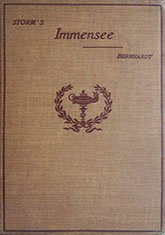Immensee
Critique • Quotes
 1902 edition
1902 editionFirst publication
1849–1851
Literature form
Novella
Writing language
German
Author's country
Germany
Length
Approx. 11,500 words
Unsuspected deep waters
Immensee is one of those seemingly simple, short fictional works that can read differently each time you sample it.
The story recalled by an old man is more or less the same each time through. A young boy Reinhardt forms a close bond with the younger Elizabeth, largely based on telling her fairy stories, and he anticipates spending his life with her, but as they mature they drift apart, she marries another and his attempt to recapture their past relationship brings pain to them both.
The author Theodor Storm seems to have thought the story, which made him famous and was published in many languages around the world, to be simple enough. A sentimental tale of lost youth and love. And some critics have attacked it on those grounds—too sentimental, clichéd, too obviously symbolic—as if they (including the writer) missed all the nuances that raise questions in other readers' minds.
Were the boy and girl ever really in love with each other? Or were they each deluded by their self-created image of the other? Clues to differing interpretations abound. It's worth noting the stories young Reinhardt regales Elizabeth with were apparently not spun out of his own mind. The two mentioned are a Grimm brothers fairy tale and the biblical episode of Daniel in the lions' den. When an older Reinhardt first shows her the more personal poetry he's been working on for most of his life, she is embarrassed and skips over the titles, which all refer to his thoughts of her.
This and later deflations of his expressions of feelings are also in line with the general tone of the writing. Storm goes out his way to avoid big emotional flourishes. Love is never spoken of. There are no mad embraces, no kisses, no expressions of undying devotion.
The only thing coming close to romantic expression is Reinhardt eliciting a promise from Elizabeth to wait for him for two years while he's away at school. However, he doesn't bother to stay in contact with her, leaving her to respond to another man's more faithful attentions. It is never spelled out exactly why Reinhardt treats her so, although we can speculate.
What does the heart really know?
Sometimes it seems all German writing has to do with Romanticism—either heralding this movement, taking it to extremes or reacting against it. Immensee is distinctly in the latter camp. Yes, it expounds sentiment, but seldom directly and never in an overblown manner. (Read Goethe's earlier and equally revered The Sorrows of Young Werther to see the exact opposite.) You have to determine what's really raging in the hearts of the characters by reading between the lines.
And even then you can never be entirely sure. Elizabeth is brought to tears by Reinhardt's reminiscences of their history, but is it really because she wishes, as he thinks, that they could change it to be together as lovers? Or is she mourning for the loss of an innocent friendship? Is she perhaps feeling sorry for her childhood friend who has lost his way? After all, she does appear content enough with her comfortable life without him, when he doesn't come around to upset her.
In one of the obviously symbolic episodes of Immensee (which means "lake of bees" in German), Reinhardt dives into water to swim out to a white water-lily that catches his eye. But he becomes entangled on the way and is forced back, leaving the lily floating off undisturbed. In another passage he spies what he thinks is a woman in white among the tress waiting for him, but when he approaches she disappears. In these and other cases, Elizabeth is out of his reach. If you want to take it further, you can say she is profoundly unknown by him.
In the end, we never learn how Reinhardt lives out the rest of his life, whether he finds someone else to be with or gives up on love, though we suspect he lives in memories of the past, an old man still immersed in collecting songs and rhymes, work which he began in youth.
He seems at peace with it, if somewhat wistful. But how are we to take this? He's accepted his fate in mature fashion? He remains true in his heart to Elizabeth? He's pathetic, having wasted his life and talents on something that could never be? Any way you look at it is unsettling, contrary to those critics who find Immensee too patly sentimental.
Immensee is usually classified as a novella, though a strict word count in English—depending on the translation—makes it a short story. This is probably mainly due to historical reasons, Immensee first being released internationally in book form on its own, unlike most stories that are published in collections. But it is also testament that, despite its relative brevity, it has depths that go beyond the usual romantic story. Worth re-reading.
— Eric
Critique • Quotes

